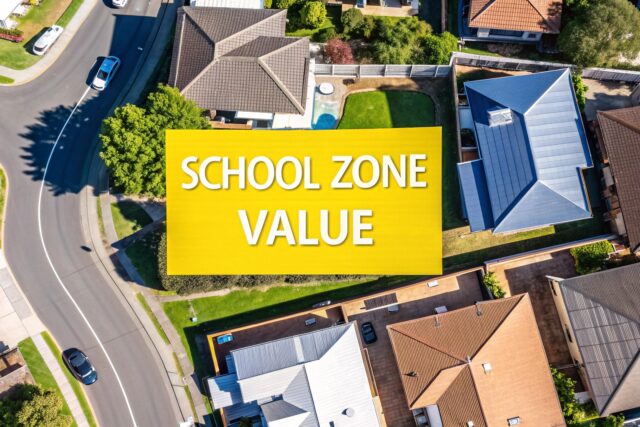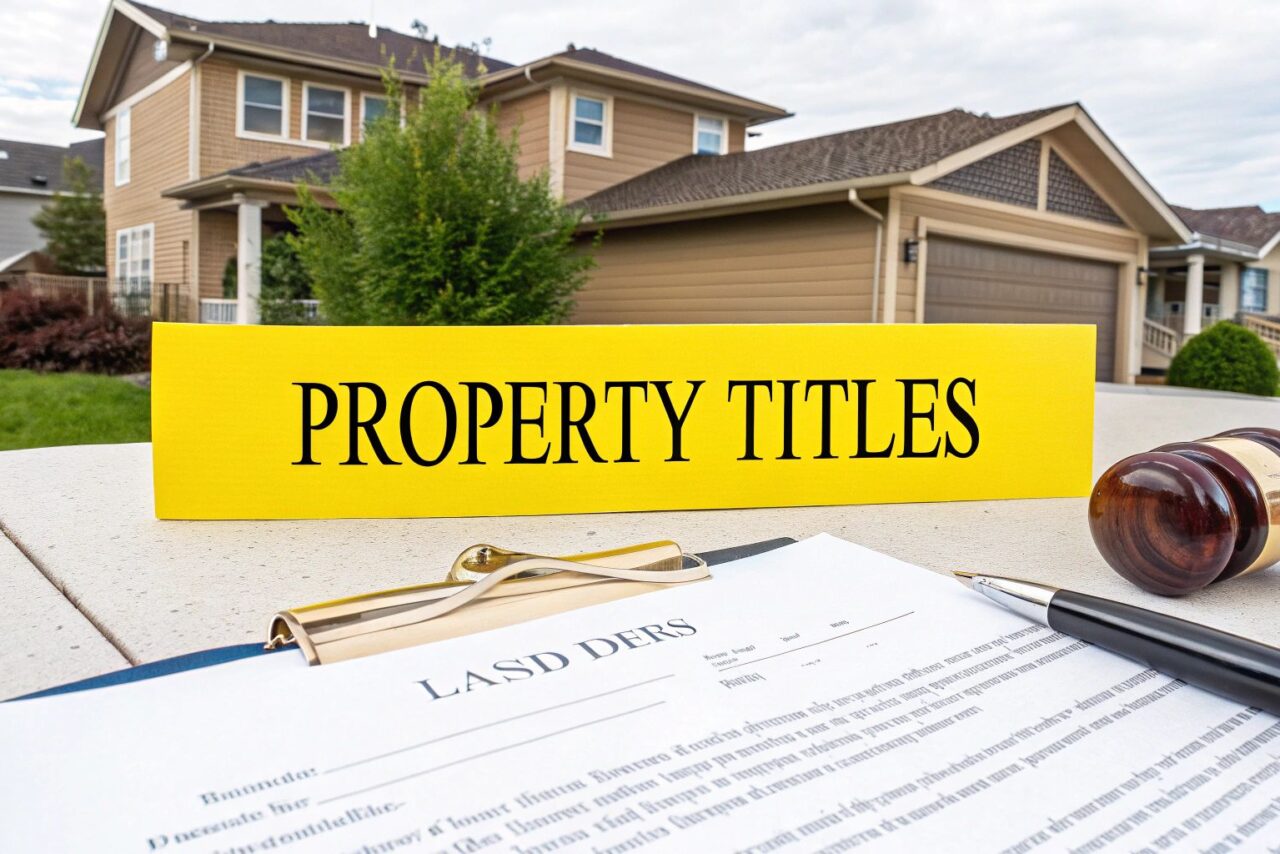
Before you start picturing your life in that perfect Thorndon villa or a slick Te Aro apartment, there’s a critical piece of paper you need to get your head around: the property title.
Think of it as the property’s legal DNA. It’s the official document that proves who owns the place and, more importantly, lays out all your rights and responsibilities as the owner.
Why Your Property Title Matters in Wellington
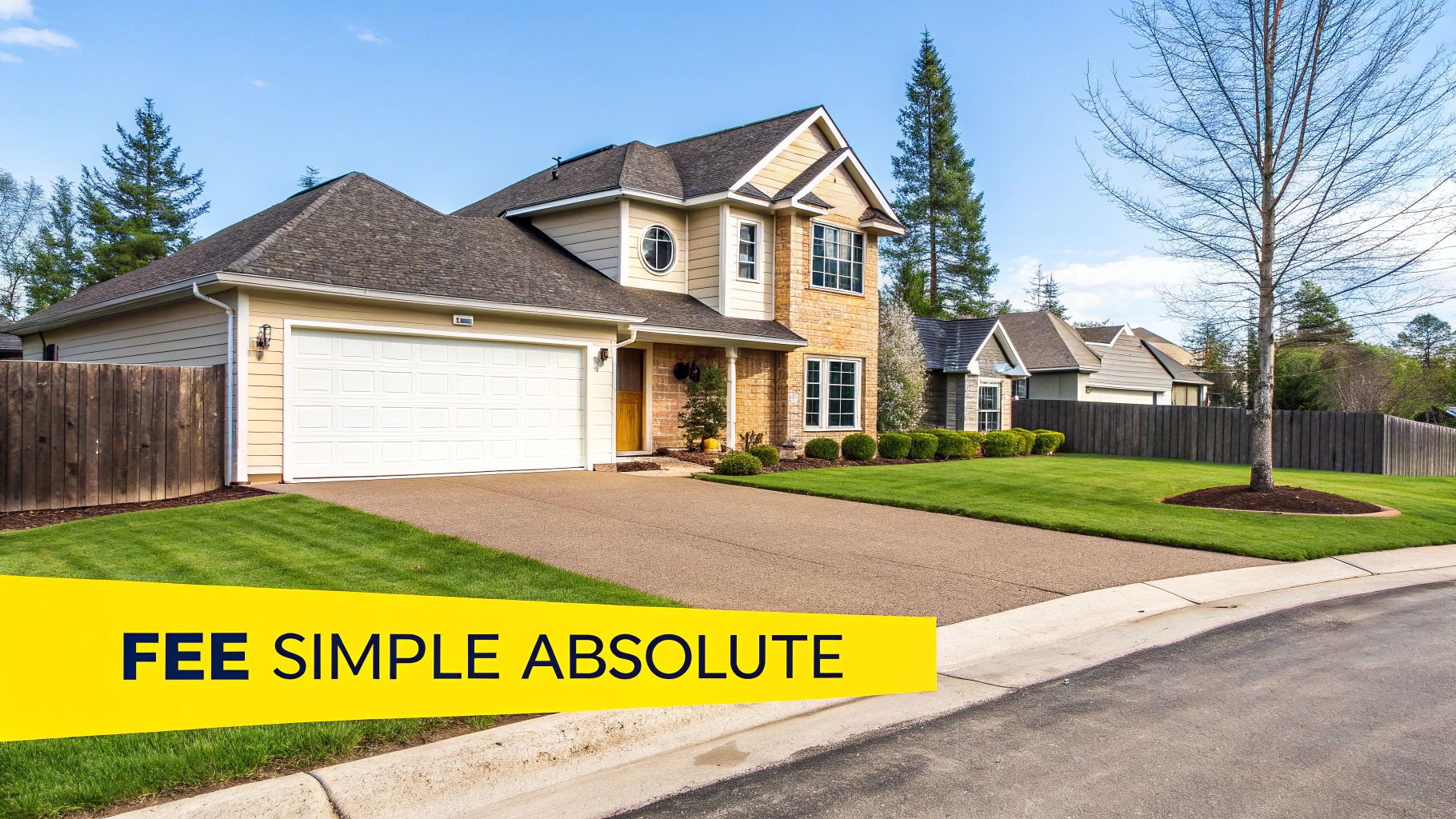
Getting the title right can be the difference between moving into your dream home and accidentally inheriting a legal nightmare. It’s that serious. In Wellington, the type of title can directly influence a property’s value, your ability to get a mortgage, and what you can do with your home in the future.
In New Zealand, property titles are the definitive legal record of who owns what land. They’ve been kept electronically by Land Information New Zealand (LINZ) since 2002, so it’s all official and above board.
This guide will walk you through the main types of property titles you’ll come across here in Wellington. We’ll break down what each one really means for you as a buyer—from the total freedom of a freehold in Karori to the tricky details of a cross-lease in Brooklyn. Diving deeper into real estate contracts can also arm you with more knowledge about the legal side of things.
Fee Simple: The Gold Standard of Ownership
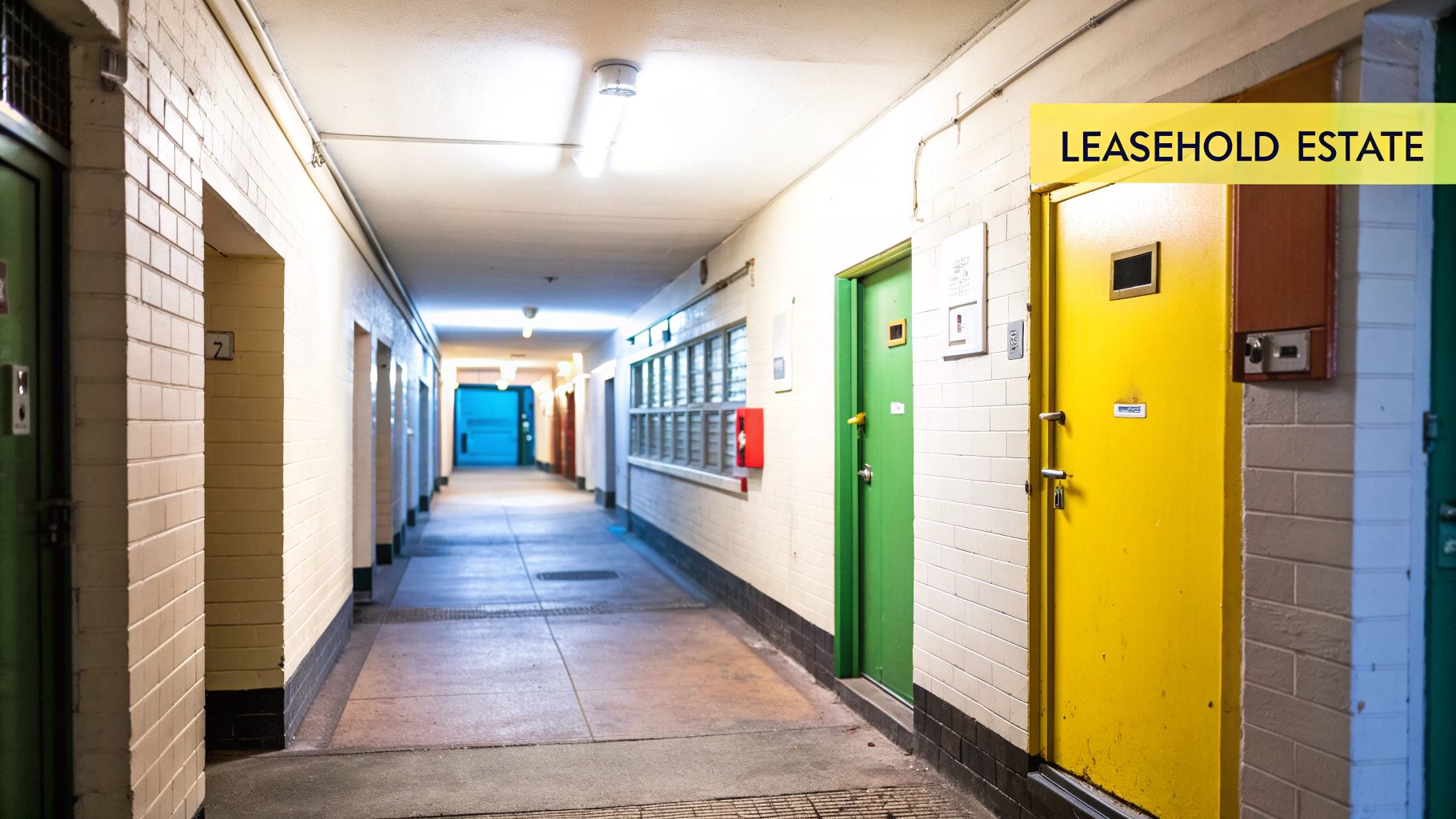
When you hear people talk about owning a home in New Zealand, this is usually what they have in mind. Fee Simple, also known as Freehold, is the most common and complete type of property ownership you can have in Wellington.
In simple terms, it means you own the land and everything permanently on it—the house, the garage, the garden, the lot. It’s all yours.
Think of that classic family home in a suburb like Ngaio, Karori, or Wadestown. With a Fee Simple title, you have the freedom to paint the house bright pink, build a deck out the back, or plant a massive vegetable garden without needing to ask for anyone’s permission (though Wellington City Council building consents and zoning rules still apply!). This complete control and autonomy is why Fee Simple properties are so sought-after and often command a premium price.
Of course, with great freedom comes great responsibility. Every bit of maintenance, from a leaky roof right down to the boundary fence, is entirely up to you. It’s also worth noting that even on these straightforward titles, things like shared driveway easements can exist, so it always pays to have your lawyer check the fine print.
Navigating Unit Titles in Apartments and Townhouses
As Wellington continues to grow and embrace more compact living, Unit Titles have become the go-to for apartments in buzzing areas like Te Aro and for townhouses popping up in suburbs like Johnsonville and Newlands.
So, what does it mean? Essentially, you own your individual unit outright, but you share ownership of all the ‘common property’. Think lifts, hallways, gardens, the roof, and the building’s exterior. It’s a bit like owning your own house but sharing the driveway and the front lawn with your neighbours.
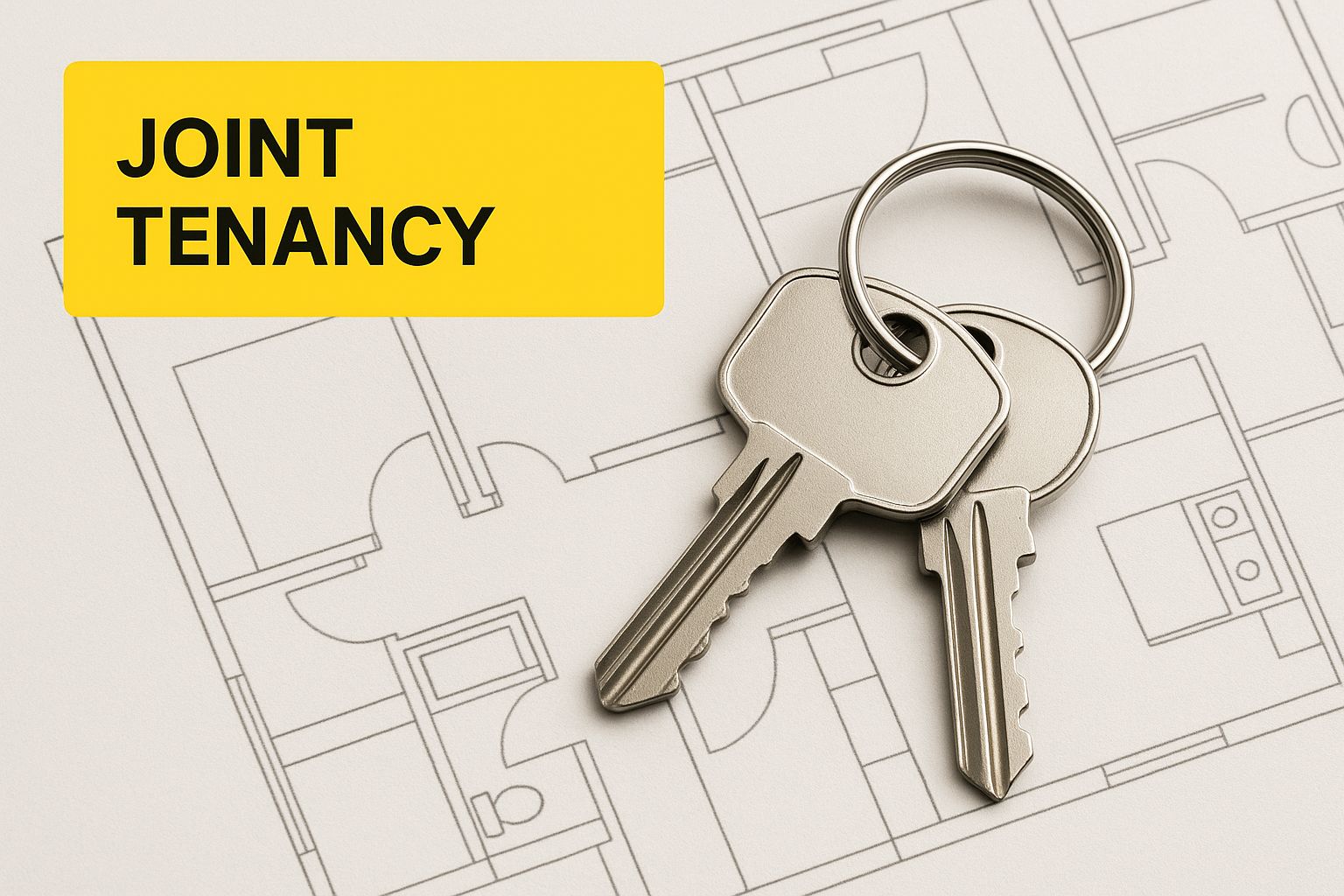
This shared ownership is managed by a Body Corporate, which is made up of all the unit owners. They set the rules for the building and collect levies to pay for maintenance, building insurance, and long-term repairs.
Because this is a more complex setup, it’s governed by specific legislation, namely the Unit Titles Act 2010. It’s one of the four main property ownership types in New Zealand, each with its own set of rules and implications for owners.
If you’re looking at a property with a unit title in suburbs like Mount Cook or Pipitea, it’s absolutely critical to do your homework on the health of the Body Corporate. You’ll want to review their meeting minutes and financial statements, paying close attention to whether they have adequate funds set aside for big-ticket items—especially earthquake-prone building rules and land insurance nuances specific to Wellington.
For a broader perspective on the local market, make sure to check out our guide on investing in New Zealand property.
Decoding the Complexities of Cross-Lease Titles
Cross-lease titles are a real Kiwi invention, a unique product of our property history. You’ll often find them on duplexes and townhouses built from the 1960s through to the 1980s, especially in Wellington suburbs like Karori, Newtown, and Vogeltown.
It’s a bit of a complicated setup. Essentially, you and your neighbours all co-own the entire piece of land under one main Fee Simple title. From there, you each lease your individual homes from the other co-owners.
This strange arrangement means you are both a landlord and a tenant at the same time. The ‘flats plan’ on your title becomes incredibly important, as any changes you want to make to your home’s exterior footprint—like adding a conservatory or a carport—require your neighbour’s consent. This is where things can get sticky, particularly if a previous owner made unapproved changes that you’ve now inherited.
It’s no surprise that the unique nature of cross-lease titles can impact a property’s value. In fact, historical data has shown that two-bedroom freehold properties sold for a median price 7.0% higher than similar-sized cross-leases. This highlights a clear preference in the market. You can learn more about the impact of property titles on value in this detailed report.
Leasehold: A Different Approach to Home Ownership
While you won’t see them as often in Wellington’s residential market, it’s crucial to get your head around the Leasehold title. Think of it this way: you’re buying the house, but not the land it sits on.
Instead, you lease the land from the owner (the lessor) for a set period and pay them regular ground rent.
The initial purchase price for a leasehold property can look incredibly appealing, which is what tempts many people in. But don’t be fooled—this comes with a serious, ongoing financial catch.
The ground rent is a continuous cost and is often reviewed and increased over time. This, combined with the fact that the property’s value can decrease as the lease term shortens, means securing a mortgage can become more difficult in the long run. It represents a different structure of home ownership with unique long-term risks and obligations.
How Your Title Impacts Mortgages and Property Value
When it comes to getting a mortgage and figuring out what a property is actually worth, the type of title it holds is a massive factor. Banks and buyers see things very differently depending on the title.
A standalone house in Khandallah or Crofton Downs with a straightforward Fee Simple title? That’s what lenders consider the gold standard. It’s often the most secure investment in their eyes, which usually means a much smoother path to getting your mortgage approved.
On the other hand, a cross-lease in Brooklyn or Berhampore with a wonky, outdated flats plan can immediately raise red flags. A bank might tell you to sort out the title defects before they’ll even consider lending you the money.
It’s a similar story for a unit title apartment in the Wellington Central. Lenders will want to do a deep dive into the Body Corporate’s financial health, check its long-term maintenance plan, and scrutinise its earthquake readiness. These details can have a huge impact on both the bank’s decision and the final sale price of the property. To get a better feel for how these factors play out in the market, it’s worth looking at our analysis of current house prices in Wellington.
This is where understanding property titles moves from theory into real-world dollars and cents. It shows exactly why getting a lawyer to do a thorough review of the title is a non-negotiable step before you ever put in an offer.
Wellington Property Title FAQs
Trying to get your head around the different property titles in Wellington can feel like a bit of a minefield, but knowing the key differences is absolutely essential. Let’s tackle some of the most common questions we hear from buyers and sellers across the city.
Mortgages and Cross-Lease Properties
Is getting a mortgage for a cross-lease property difficult in Wellington?
It can definitely throw a few spanners in the works. Wellington banks are well-acquainted with cross-lease titles, but that also means they’ll comb through them with a fine-tooth comb, looking for any issues like unconsented alterations that don’t match the official flats plan.
Any defect on the title can seriously complicate or delay your mortgage approval. This is exactly why it’s so important to get your lawyer to review the title early on and chat with your mortgage adviser before you even think about making an offer on a cross-lease home in areas like Johnsonville or Newtown.
Body Corporate Red Flags
What are the red flags in Body Corporate records for a Te Aro apartment?
When you’re looking at buying a unit title property, digging into the Body Corporate’s meeting minutes, financial statements, and long-term maintenance plan is completely non-negotiable.
In Wellington, you need to be on high alert for any mention of unresolved earthquake strengthening issues, ongoing weather-tightness problems, big disputes between owners, or a long-term maintenance plan that’s seriously underfunded. A healthy, proactive Body Corporate is a massive asset; a dysfunctional one can become a huge liability.
Converting a Cross-Lease Title
Should I convert my cross-lease to fee simple before selling in Karori?
In many Wellington suburbs, like Ngaio or Karori, making the switch to a Fee Simple title can add a substantial amount to your property’s value and make it attractive to a much wider pool of buyers. But it’s not a simple tick-box exercise.
The conversion process needs your co-owner’s full sign-off, and you’ll have costs for surveying and council fees to factor in. To figure out if it’s worth it, your best bet is to get a property appraisal that values your home ‘as is’ and then gives you a potential value with a Fee Simple title. This will tell you if the financial reward is likely to outweigh the time and money you’ll need to invest.
How to Confirm a Property Title
How do I confirm a property’s title type?
The Record of Title is a public document. As your real estate agent, I can get a copy for you, or you can order one yourself directly from Land Information New Zealand (LINZ).
More importantly, as a routine part of the due diligence process, your lawyer will always get and carry out a detailed search of the title. This is a crucial step that uncovers any potential issues before your purchase agreement goes unconditional, giving you complete peace of mind.
So, Where Do We Go From Here?
Getting your head around property titles is a massive step towards making a smart move in the Wellington market. It’s not the most glamorous part of buying a house, but it’s one of the most important.
Each title type we’ve looked at—from the straightforwardness of freehold to the community living of a unit title—comes with its own unique mix of freedom, responsibilities, and of course, financial implications.
No matter which type of property has caught your eye, the single best piece of advice I can give is this: always, always get professional legal advice. A good property lawyer is worth their weight in gold.
They’ll dig into the title for you, flagging any of those tricky conditions, easements, or covenants that could cause headaches later on. This isn’t just a box-ticking exercise; it’s about making sure you walk into your purchase with your eyes wide open, with no nasty surprises waiting for you.
If you’re now wondering how your own property’s title might affect its value, or you’re starting to think about what’s next for you in the market, it’s worth learning more about the process of thinking of selling your Wellington home. The more you know, the more confident you’ll feel on your property journey.
Ready to find out what your Wellington property is worth in today’s market? Get in touch with Halina Kuchciak for a no-obligation, complimentary market appraisal.

.
.
.
.
.
.
Disclaimer: The real estate content shared on this blog is intended for general informational purposes only and industry observations. The content may reflect personal views or reference third-party sources, but it is not a substitute for tailored professional advice. Real estate decisions often involve legal, financial, and regulatory complexities, and readers should seek independent guidance from qualified specialists such as legal advisors, financial consultants, or compliance professionals before acting on any information presented here. No warranty is given as to the accuracy, completeness, or current relevance of the material.



